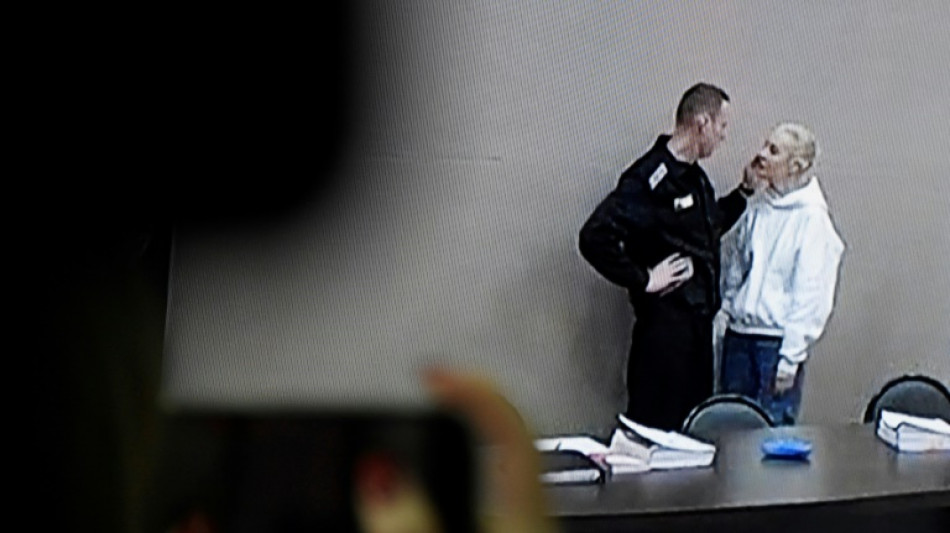

At new fraud trial, Navalny vows to fight on against Kremlin
Imprisoned Kremlin critic Alexei Navalny said Tuesday he would keep challenging Russia's leadership during the opening of a new fraud trial that could extend his jail term by more than a decade.
Navalny appeared at the beginning of the hearing via video link wearing a prison uniform and flanked by guards at the makeshift court inside his penal colony, smiling and embracing his wife.
German Chancellor Olaf Scholz said the new case was "incompatible" with the rule of law, speaking during a press conference with Russian leader Vladimir Putin in Moscow.
The 45-year-old opposition leader has already been behind bars for a year, after surviving a poison attack he blames on the Kremlin.
He is serving out a two-and-a-half year sentence on old embezzlement charges, but the fresh charges could see his time behind bars significantly extended.
"You're going to increase my term indefinitely. What can we do about it?" Navalny said during the court hearing.
"The activities of people are more important than the fate of one individual. I'm not afraid."
The new case was launched in December 2020, when Navalny was recovering in Germany after a poisoning attack with Soviet-designed poison.
The Russian authorities have repeatedly any involvement.
- 'Illegal persecution' -
Rights groups have criticised authorities for holding the closed-door hearing inside the maximum-security prison in Pokrov, some 100 kilometres (60 miles) east of Moscow.
Investigators accuse Navalny of stealing for personal use more than $4.7 million in donations that were given to his political organisations. The charges carry a maximum penalty of 10 years in prison.
A prosecutor during the trial accused Navalny and his allies of "misleading citizens" with the "deliberate" aim of stealing funds.
Navalny grew a wide following among liberal-leaning Russians with videos exposing the corruption among the elite. Many of the investigations gained millions of views online.
Navalny's allies decried the trial as a sham and his lawyer said it came as part of Kremlin efforts to remove him from political life.
"We believe the persecution of Navalny is illegal, is distinctly political in nature, and aimed at discrediting and removing him from political activity," lawyer Olga Mikhailova said.
- 'Incompatible' with rule of law -
The start of the trial comes during a week of intensive talks between Russia and the West over Ukraine, with Scholz the latest leader in Moscow for talks with Putin.
During a press conference with the Russian leader, Scholz condemned legal proceedings against Navalny, following appeals earlier from the opposition leader's allies to raise his case with Putin.
"My position on the Navalny case is very clear: his judgement is incompatible with the principles of the rule of law and I have expressed this view on many occasions," Scholz said.
Navalny was treated by doctors in Berlin and Germany blamed his near-fatal poisoning on the Kremlin. Former chancellor, Angela Merkel, used her final visit to Moscow last year to ask Putin to free Navalny.
On the eve of the hearing Amnesty International criticised the "sham trial, attended by prison guards rather than the media".
"It's obvious that the Russian authorities intend to ensure that Navalny doesn't leave prison any time soon," it said on Monday.
Navalny's poisoning and arrest sparked widespread condemnation abroad as well as sanctions from Western capitals.
After his arrest, Navalny's political organisations across the country were declared "extremist" and shuttered, while many key aides fled Russia fearing prosecution.
F.Abate--LDdC



